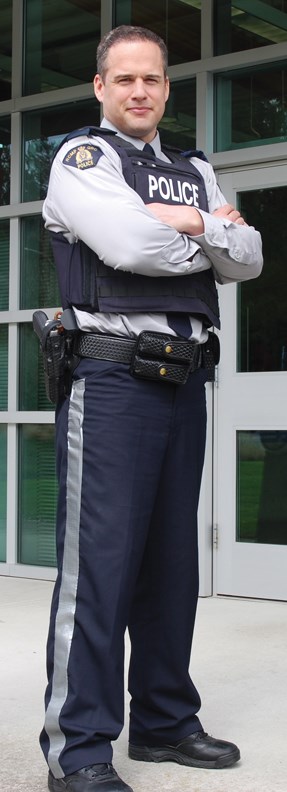A Sunshine Coast RCMP officer at the forefront of a movement for better pay and improved working conditions says he’s worried reports released this week urging the federal government to address issues like harassment and bullying on the job will end up gathering dust like similar reports in the past.
Sgt. Chris Backus told Coast Reporter he thinks the Civilian Review and Complaints Commission (CRCC) report on workplace harassment, which was issued Monday, is “damning. It’s bluntly damning, but it’s the truth.”
The CRCC makes 11 recommendations, including civilian governance or oversight of the RCMP, similar to the police boards that oversee many municipal forces, and bringing in civilians to handle specialized administrative roles like human resources and labour relations.
That report was followed Tuesday by an Auditor General’s report criticizing the RCMP for dragging its feet on a new mental health strategy for members. There’s also a hearing underway in New Brunswick over allegations RCMP violations of the Labour Code contributed to the deaths of three Mounties in a 2014 shooting.
Backus was one of the first RCMP members to get involved in going stripeless in April, by removing or covering the trademark yellow stripe on the RCMP uniform or wearing plain cargo pants. The protest that started at the Sunshine Coast and North Vancouver detachments has spread across the country and shows no sign of fading away.
Backus has also been one of the most outspoken of the protesters, granting print interviews and appearing on television to talk about the issues. Backus said he’s learned a lot about the worries of his fellow RCMP members.
“Given the vast contrast of policing requirements that we have across the country, it’s really interesting to see the differences in what the memberships want,” he said. “But there is one common denominator, and it’s that the membership feels there’s a completely broken contract for the senior management of the RCMP to be able to ethically, and accurately, represent the interests of the frontline members.”
Since the protest started, the National Police Federation has gained enough members to apply to form a union for RCMP officers, and legislation to allow unionization (Bill C-7) seems to be moving forward again in Ottawa after a debate on amendments proposed by the Senate.
That’s good news according to Backus, but in his view the various critical reports point to the need for much bigger changes. “Twenty reviews in the last 10 years – something like that; 200 recommendations and none have been completely followed through and there’s been absolutely no cultural change.”
Backus also said that, so far, he hasn’t faced any discipline for his role in the protests, but he was asked to meet with some of the RCMP’s senior management in B.C. who told him to be cautious about continuing to speak out publicly about concerns within the force.
He said he’s determined to forge ahead, and would like to hear those senior mangers speak out too. “I’m critical that [they] are not speaking out as to why [they] cannot bring about positive change in the RCMP… push for change. Don’t sit silent and watch your organization suffer.”
The ongoing protests have even spawned their own social media hashtag, #Backus, a play on Backus’ name that’s also a call for RCMP brass and Canadians in general to “back” the members in their push for changes.



